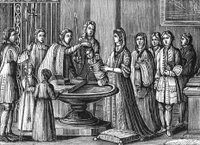
"But Jesus said, Suffer little children, and forbid them not, to come unto me: for such is the kingdom of Heaven." (Matt. 19:14)
"Holy Baptism is the basis of the whole Christian life, the gateway to life in the Spirit, and the door which gives access to the other sacraments. Through Baptism we are freed from sin and reborn sons of God; we become members of Christ, are incorporated into the Church and made sharers in her mission: "Baptism is the sacrament of regeneration through water in the word." (Cathecism of the Catholic Church (c) 1995)
When I studied infant baptism in highschool (I went to a Catholic private school) I was taught that my 'baptism' at that point was an indelible mark. Infant baptism is percieved as necessesary because of the idea that it erases 'original sin.'
Some facts to consider: 1. Faith alone justifies (Rom. 3:26) . 2. Everyone who ever got baptized in the New Testament excersized faith first, infants cannot do this (Acts 2:41; 8:36-38; 9:15-18; 10:44-47; 16:14-15, 30-34). 3. Jesus laid his hands on these children, he did not baptize them, in fact He did not baptize anyone (John 4:2).
2 comments:
Baptists and evangelicals are absolutely correct...there is no SPECIFIC mention in the New Testament that the Apostles baptized infants. There are references to entire households being converted and baptized, but we orthodox cannot prove, just from Scripture, that these households had infants, and neither can Baptists and evangelicals prove, just from Scripture, that they did not.
One interesting point that Baptists/evangelicals should note is that although there is no specific mention of infant baptism in the Bible...neither is there a prohibition of infant baptism in the Bible. Christians are commanded by Christ to go into all the world and preach the Gospel and to baptize all nations. No age restrictions are mentioned. If Christ had intended his followers to understand that infants could not be baptized in the New Covenant, in a household conversion process as was the practice of the Jews of Christ's day in converting Gentile households to the Covenant of Abraham, it is strange that no mention is made of this prohibition.
So, the only real way to find out if Infant Baptism was practiced by the Apostles is to look at the writings of the early Christians, some of whom were disciples of the Apostles, such as Polycarp, and see what they said on this issue.
And here is a key point: Infant Baptism makes absolutely no sense if you believe that sinners can and must make an informed, mature decision to believe in order to be saved. Infants cannot make informed, mature decisions, so if this is the correct Doctrine of Justification/Salvation, Infant Baptism is clearly false teaching. But the (arminian) Baptist/evangelical Doctrine of Justification/Salvation is unscriptural. Being forced to make a decision to obtain a gift, makes the gift no longer free. This is salvation by works!
Baptism is a command of God. It is not a work of man. God says in plain, simple language, in multiple locations in the Bible, that he saves/forgives sins in Baptism. We orthodox Christians accept God's literal Word. We take our infants to be baptized because God says to do it. Our infants are not saved because we perform the act of bringing them to the baptismal font...they are saved by the power of God's Word pronounced at the time of the Baptism. Christians have believed this for 2,000 years!
There is no evidence that any Christian in the early Church believed that sinners are saved by making a free will decision and then are baptized solely as a public profession of faith. None.
Gary
Luther, Baptists, and Evangelicals
http://www.lutherwasnotbornagain.com/2013/06/the-origen-of-baptistevangelical.html
The fact that God, according to Scriptures, require repentance and the exercise of faith for salvation as a prerequisite for Baptism mitigates infants from the Lord's ordinance.
Polycarp isn't Scripture. Scripture trumps all.
"We take our infants to be baptized because God says to do it." God did not say so anywhere in Scriptures to baptize infants.
I am sure we can go around and around on this topic, and not get anywhere, so I say...any further discussion is practically moot.
Post a Comment